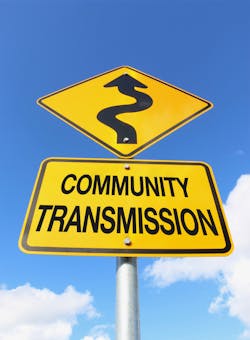A team of population health experts is arguing that the use of community health workers (CHWs) will become indispensable as health system leaders and community leaders nationwide attempt to master the situation around the COVID-19 pandemic.
Writing on Nov. 5 in the Perspectives section of The New England Journal of Medicine, three population health experts share their thoughts in the article “Community Health Workers and Covid-19—Addressing Social Determinants of Health in Times of Crisis and Beyond.” The article’s authors—Patricia J. Peretz, M.P.H., Nadia Islam, Ph.D., and Luz Adriana Matiz, M.D.—are, respectively, professionals in the Division of Community and Population Health, New York–Presbyterian Hospital (P.J.P.), the Department of Population Health, NYU Grossman School of Medicine (N.I.), and the Department of Pediatrics, Columbia University Irving Medical Center (L.A.M.) — all in New York.
“As the United States navigates the uncertainties of Covid-19 and begins a long-overdue process of confronting systemic racism,” the authors write, “the communities most affected by poverty, racism, and language barriers and those with the largest populations of immigrants continue to have the worst health outcomes. In the weeks immediately after the pandemic spread to the United States, disadvantaged communities were faced with reduced access to care, a widening digital divide, and inadequate supplies, such as food and diapers. Investing in community health workers (CHWs) and community-based organizations can help address the social determinants of poor health that disproportionately affect low-income, minority populations and that are magnified during times of crisis. These workers and organizations can help improve material conditions, facilitate access to health care systems, and provide psychosocial support.”
Importantly, the authors note, “CHWs are trusted members of local communities who share lived experiences with their neighbors and peers, and they are experts in navigating complex systems of care, serving as a link between clinical and community-based services and the people who need them most.2 When CHWs are integrated within health care systems, they advocate on behalf of patients and can play a bridging role between patients and clinicians, transferring and interpreting information and ensuring that patients are connected to care. CHWs have been shown to reduce the burden of illness among people with chronic diseases and to improve their ability to manage their own conditions.3 They are also well positioned to address the misinformation, fear, and stigma surrounding Covid-19 by providing timely, accurate information about Covid-19 transmission, precautions that people can take to protect themselves and their families, and tools for obtaining access to care and support.”
One practical example that the authors describe is what happened in New York City, when COVID-19 “struck early and hard.” It quickly became apparent that the virus was hitting some neighborhoods far harder than others. Indeed, the authors note, “The city’s data revealed that 8 of the 10 ZIP Codes with the most deaths from Covid-19 are home to low-income populations that are predominantly Black, Hispanic, and Asian.4 Although the local clinical response to Covid-19 was swift and community-based organizations mobilized to meet rapidly increasing demand, limited access to information, health care, social support, and material resources endangered people in many communities. Our institutions, New York–Presbyterian Hospital and the NYU Grossman School of Medicine, are among the health care organizations that incorporated CHWs into their multidisciplinary response to Covid-19. In collaboration with community-based organizations, CHW teams proactively contacted socially isolated patients, connecting them with sources of critically important care and support. This experience has shown that, during times of crisis, CHWs may be the lone connection between some patients and an ever-changing — and increasingly digital — health care system.”
What’s more, the authors note, bilingual and multilingual community health worker teams at New York–Presbyterian Hospital and the NYU Grossman School of Medicine “have delivered culturally and linguistically tailored health coaching, support, and health system navigation services to underserved communities throughout New York City. The 50 CHWs affiliated with the two institutions and with local community-based organizations move between community and clinical environments.”
It is on those types of foundations that communities can build, the authors argue, though they note that forms of payment to CHWs need to be developed consistently and usefully. That said, the authors conclude, “We believe that CHW programs should be carefully designed, offer adequate training and ongoing supervision of workers, and be integrated into stable systems with sustainable funding. Recruitment should be based on qualities including empathy and cultural connectedness, rather than on academic qualifications, and CHWs should be members of both the health care teams and the communities in which they work. As we define our path forward from the Covid-19 crisis, we should recognize the integral work of CHWs in supporting patients and communities, including the critical role they have played as frontline team members during the pandemic,” they state. “Now is the time for payers and health care systems to take action to invest in a sustainable CHW workforce.”


